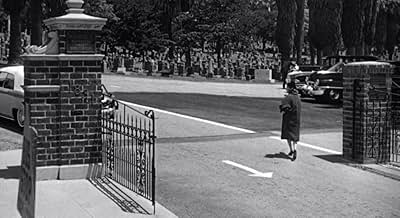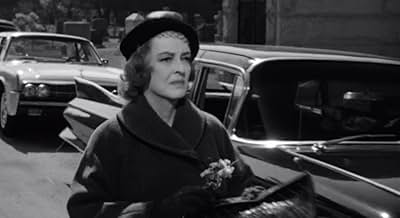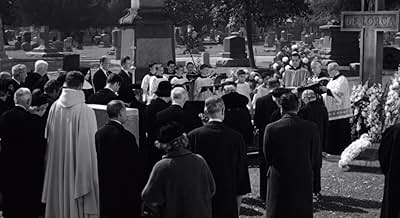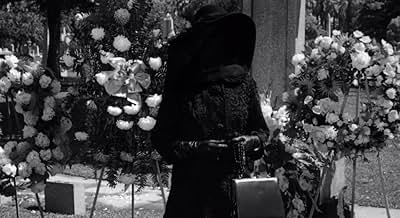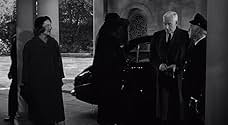IMDb RATING
7.3/10
7.1K
YOUR RATING
The working-class twin sister of a callous, wealthy woman impulsively murders her out of revenge and assumes her identity, but impersonating her dead twin is more complicated and risky than ... Read allThe working-class twin sister of a callous, wealthy woman impulsively murders her out of revenge and assumes her identity, but impersonating her dead twin is more complicated and risky than she anticipated.The working-class twin sister of a callous, wealthy woman impulsively murders her out of revenge and assumes her identity, but impersonating her dead twin is more complicated and risky than she anticipated.
- Director
- Writers
- Stars
Walter Bacon
- Juror
- (uncredited)
Brandon Beach
- Bar Patron
- (uncredited)
Henry Beckman
- Prosecutor
- (uncredited)
Perry Blackwell
- Electronic Organist in Bar
- (uncredited)
- Director
- Writers
- All cast & crew
- Production, box office & more at IMDbPro
Featured reviews
Nobody in film has yet portrayed evil bitch, and sometimes crazy evil bitch, as well and as often as the late great Bette Davis, as evidenced by such films as "Of Human Bondage", "Whatever Happened To Baby Jane", and "The Nanny", just to name a few that come immediately to mind. Capable of spitting out lines such as "Ah'd luv tuh kiss yuh, but ah jus' washed mah hair" (from "Cabin In the Cotton", 1932), "Every time you kissed me, I had to wipe my mouth! Wipe my mouth!" (from "Of Human Bondage", 1934) to "But Blanche, yuh ahhh in that chair, yuh ahhhhhhh!" (from "Whatever Happened To Baby Jane", 1962), Bette Davis made a lucrative living with her hip-swinging sashaying stride and her mannerisms that still make her a favorite of drag queens everywhere.
In "Dead Ringer", Bette was once again cast in the dual role of good sister/bad sister (Edith Phillips/Margaret DeLorca) similar to her dual roles in "A Stolen Life" (1946, with Glenn Ford). Paul Henreid, her co-star in "Now Voyager" - remember him in the classic scene that involved his lighting two cigarettes and handing Davis's character one of them - directs. "Dead Ringer"'s premise is simple: good sister impulsively tries to step into shoes of deceased bad sister in an ill-conceived move to improve her own quality of life, without thinking of the inherent consequences. In this case, as in the case of "A Stolen Life", Davis inherits the dead bad sister's myriad mix of self-imposed problems, but with worse consequences.
And as veteran filmgoers have realized for many years, the family dog always knows who's who.
Karl Malden, as Davis' earnest boyfriend (and cop) Sgt. Jim Hobbson is basically re-enacting his earnest boyfriend characterization from "A Streetcar Named Desire", and Peter Lawford, who was a real-life playboy and drunk, (in addition to allegedly acting as a bit of a pimp for the Kennedys, circa the Marilyn Monroe/John F. Kennedy/Robert Kennedy liasons era), plays Tony Collins...the drunken playboy boyfriend of the dead bad sister, Margaret DeLorca.
"Dead Ringer" was made in an era of more rudimentary special effects, so Davis's two characters interacting almost face-to-face in some scenes was quite innovative for the time, well-done (better than the obvious stand-in used for some scenes) and still holds up well.
Fun times ensue for all. Classic Bette melodrama.
In "Dead Ringer", Bette was once again cast in the dual role of good sister/bad sister (Edith Phillips/Margaret DeLorca) similar to her dual roles in "A Stolen Life" (1946, with Glenn Ford). Paul Henreid, her co-star in "Now Voyager" - remember him in the classic scene that involved his lighting two cigarettes and handing Davis's character one of them - directs. "Dead Ringer"'s premise is simple: good sister impulsively tries to step into shoes of deceased bad sister in an ill-conceived move to improve her own quality of life, without thinking of the inherent consequences. In this case, as in the case of "A Stolen Life", Davis inherits the dead bad sister's myriad mix of self-imposed problems, but with worse consequences.
And as veteran filmgoers have realized for many years, the family dog always knows who's who.
Karl Malden, as Davis' earnest boyfriend (and cop) Sgt. Jim Hobbson is basically re-enacting his earnest boyfriend characterization from "A Streetcar Named Desire", and Peter Lawford, who was a real-life playboy and drunk, (in addition to allegedly acting as a bit of a pimp for the Kennedys, circa the Marilyn Monroe/John F. Kennedy/Robert Kennedy liasons era), plays Tony Collins...the drunken playboy boyfriend of the dead bad sister, Margaret DeLorca.
"Dead Ringer" was made in an era of more rudimentary special effects, so Davis's two characters interacting almost face-to-face in some scenes was quite innovative for the time, well-done (better than the obvious stand-in used for some scenes) and still holds up well.
Fun times ensue for all. Classic Bette melodrama.
Many of the films of the 60s were boring as hell. It took a star like Bette Davis to bring the necessary fire to this double role as twins in "Dead Ringer." In other hands, this might have been unworthy, but with Davis' magical screen presence, you can't take your eyes off her (both of her!) Even in small scenes, she's real and radiant (when Jim gives her the watch for her birthday). Andre Previn's score is superb. I loved the music after Edith storms out of Margaret's bedroom in the beginning of the film when she sees the portrait of her sister's dead husband and HER former lover, followed by that tender moment with the butler.
With the performances that got Oscar nominations during the '60s, some were pretty dull. Compared to them, Bette deserved a nod for best actress. Davis was wonderful in this. Her years of acting experience before the cameras was on full display in every scene...she was the consummate professional.
Did you notice Perry Blackwell at the organ? She also appeared in the Doris Day/Rock Hudson hit,"Pillow Talk" as the nightclub singer a few years prior. The drummer in this was married to Nancy Wilson!
With the performances that got Oscar nominations during the '60s, some were pretty dull. Compared to them, Bette deserved a nod for best actress. Davis was wonderful in this. Her years of acting experience before the cameras was on full display in every scene...she was the consummate professional.
Did you notice Perry Blackwell at the organ? She also appeared in the Doris Day/Rock Hudson hit,"Pillow Talk" as the nightclub singer a few years prior. The drummer in this was married to Nancy Wilson!
This movie could easily have become a sad and pathetic parody of the final stages of a great actor's career. Instead it marks another pinnacle in the history of one of Hollywood's greatest players, Bette Davis. There are not enough superlatives to describe her performance. Not only does Davis carry the movie, she is the movie. Her performance transcends the material. This movie is an example of where the actor succeeds in elevating the script. The story is cleverly written and beautifully photographed in a black and white context that sets the mood for the movie. But it is Bette Davis's performance as a twin which makes this movie not only watchable but fun to watch. Like Bette Davis herself, this movie has aged well. Davis has since departed us but her legacy lives on in her many wonderful movies, including this one.
...even when some of those small things are not so small. 20 years ago Edith Phillips was going to marry wealthy Frank DeLorca. The wealth didn't really matter to Edith, but it mattered to her twin sister Margaret. It mattered so much that she slept with Frank and then announced she was pregnant, so Frank married Margaret out of obligation. There is still a shred of production code left, so I am explaining more than the film does. Edith has never forgiven Margaret for taking Frank away from her, but I'd say Frank does share some blame too since he must have slept with her.
So in modern day, which is where the film actually starts, Frank has died and Edith goes to Frank's funeral. This is where she finds out by the offhand remark of the DeLorca chauffeur that there never was a child. Margaret lied to both Frank and Edith to get the life of ease she wanted. In Edith's personal life she is about to lose the bar she runs because of back rent. She does good business but she is too generous for her own good. But that generosity does not extend to Margaret. Margaret, not knowing that Edith suspects the fake pregnancy business, goes to visit her in her apartment. After making double doggone sure that there never was a baby by getting Margaret to confess, Edith kills Margaret, changes outfits with her, dumps a suicide note in Margaret's lap that is supposedly written by Edith, and goes to take up Margaret's life as a DeLorca where she left off.
The thing is, what she really wanted that Margaret had - Frank - is dead, and the rest of it is rather empty without him. Plus there are any number of things to trip her up, starting with the fact that she knows none of the servants, does not know her way around the DeLorca mansion, and does not know Margaret's routine or friends. On top of this Margaret had a boyfriend on the side who is not exactly a catch - an obvious fortune hunter played by a rather fat and flabby Peter Lawford. And he is blackmailing "Margaret" and for good reason. Complications, some very ironic, ensue.
Davis still has it as she convincingly plays the working class Edith, the pampered Margaret, and Edith masquerading as Margaret quite convincingly. Karl Malden is quite touching as Edith's cop boyfriend. He has two possible endings to Edith's story, neither which is flattering, and he doesn't know which to believe. The jazz band playing over Edith's killing of her sister and covering it up adds to the tension of the scene.
I'd recommend this one.
So in modern day, which is where the film actually starts, Frank has died and Edith goes to Frank's funeral. This is where she finds out by the offhand remark of the DeLorca chauffeur that there never was a child. Margaret lied to both Frank and Edith to get the life of ease she wanted. In Edith's personal life she is about to lose the bar she runs because of back rent. She does good business but she is too generous for her own good. But that generosity does not extend to Margaret. Margaret, not knowing that Edith suspects the fake pregnancy business, goes to visit her in her apartment. After making double doggone sure that there never was a baby by getting Margaret to confess, Edith kills Margaret, changes outfits with her, dumps a suicide note in Margaret's lap that is supposedly written by Edith, and goes to take up Margaret's life as a DeLorca where she left off.
The thing is, what she really wanted that Margaret had - Frank - is dead, and the rest of it is rather empty without him. Plus there are any number of things to trip her up, starting with the fact that she knows none of the servants, does not know her way around the DeLorca mansion, and does not know Margaret's routine or friends. On top of this Margaret had a boyfriend on the side who is not exactly a catch - an obvious fortune hunter played by a rather fat and flabby Peter Lawford. And he is blackmailing "Margaret" and for good reason. Complications, some very ironic, ensue.
Davis still has it as she convincingly plays the working class Edith, the pampered Margaret, and Edith masquerading as Margaret quite convincingly. Karl Malden is quite touching as Edith's cop boyfriend. He has two possible endings to Edith's story, neither which is flattering, and he doesn't know which to believe. The jazz band playing over Edith's killing of her sister and covering it up adds to the tension of the scene.
I'd recommend this one.
Bette Davis plays twin sisters, one glamorous, the other homely, in this tale of deception, betrayal, and murder. What makes the story so fascinating is its delicious irony, as the homely sister, Edith, becomes ever more ensnared in her own tangled web.
The story is marred slightly by some obvious contrivances and plot holes. But it has lots of twists and turns. And Bette Davis, with her memorable voice, her gestures, and those Bette Davis eyes renders the Edith character engaging, as she realizes something important that she had not foreseen, and then makes an effort not to be found out. It's all about the internal tension of faking a false identity.
Much of the plot is consumed in detail, as we watch Edith squirm and fret when confronted with small tasks like switching clothes with a corpse, faking a signature, or determining the combination to a wall safe. These action details are somewhat tedious. But they give Davis lots of opportunity to act.
The film's B&W cinematography is fine. The split screen technology wherein both sisters appear together in the same scene is rather self-conscious, but was quite advanced for its time. Rear screen projection is another technique that is used, but seems primitive by today's technical standards. The film's lighting is quite good.
The film gets off to a really good start with a snazzy, and very Hitchcockian, title sequence accompanied by Andre Previn's excellent original score. The film's supporting cast includes Karl Malden, Estelle Winwood, and Jean Hagen. But, though they are all credible in their roles, this film belongs to Bette Davis. It's her show. And a viewer's response to the film will hinge largely on their impression of Bette Davis and her ability to play two roles. Personally, I think she did a splendid job.
The story is marred slightly by some obvious contrivances and plot holes. But it has lots of twists and turns. And Bette Davis, with her memorable voice, her gestures, and those Bette Davis eyes renders the Edith character engaging, as she realizes something important that she had not foreseen, and then makes an effort not to be found out. It's all about the internal tension of faking a false identity.
Much of the plot is consumed in detail, as we watch Edith squirm and fret when confronted with small tasks like switching clothes with a corpse, faking a signature, or determining the combination to a wall safe. These action details are somewhat tedious. But they give Davis lots of opportunity to act.
The film's B&W cinematography is fine. The split screen technology wherein both sisters appear together in the same scene is rather self-conscious, but was quite advanced for its time. Rear screen projection is another technique that is used, but seems primitive by today's technical standards. The film's lighting is quite good.
The film gets off to a really good start with a snazzy, and very Hitchcockian, title sequence accompanied by Andre Previn's excellent original score. The film's supporting cast includes Karl Malden, Estelle Winwood, and Jean Hagen. But, though they are all credible in their roles, this film belongs to Bette Davis. It's her show. And a viewer's response to the film will hinge largely on their impression of Bette Davis and her ability to play two roles. Personally, I think she did a splendid job.
Did you know
- TriviaAs Karl Malden's police sergeant character leaves his desk, he calls for a colleague named "Sekulovich" to toss him his hat. "Sekulovich", in fact, is Malden's birth name.
- GoofsEdie's framed "first-earned dollar" from her cocktail lounge has an inscription dated "New Years 1957" but the signature on the dollar bill is from JFK's Secretary of the Treasury, who did not begin until 1961.
- Quotes
Margaret DeLorca: [to her identical twin sister Edith] You shouldn't smoke. It's bad for your skin. I gave it up years ago.
- ConnectionsFeatured in Stardust: The Bette Davis Story (2006)
Details
- Release date
- Country of origin
- Languages
- Also known as
- La Mort frappe trois fois
- Filming locations
- N Figueroa St & W Temple St, Los Angeles, California, USA(Exteriors. As Edie's Bar. Demolished and redeveloped.)
- Production company
- See more company credits at IMDbPro
Box office
- Budget
- $1,200,000 (estimated)
- Runtime
- 1h 56m(116 min)
- Color
- Aspect ratio
- 1.85 : 1
Contribute to this page
Suggest an edit or add missing content


